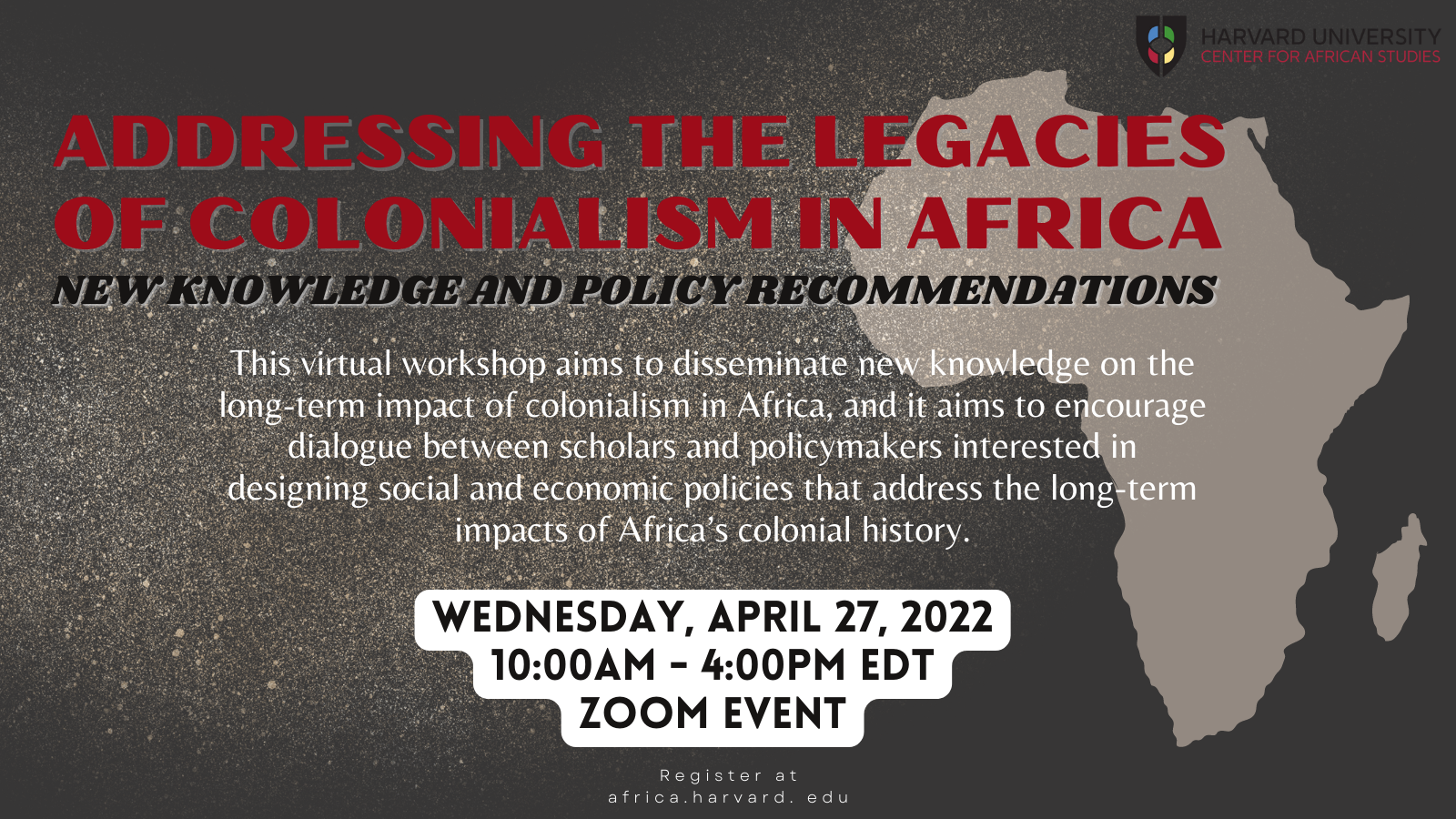Date:
Location:

This workshop has a two-fold goal. First, it aims to disseminate new knowledge on the long-term impact of colonialism in Africa. Second, it aims to encourage dialogue between scholars and policymakers interested in designing social and economic policies that address the long-term impacts of Africa’s colonial history.
The workshop will be a half-day virtual event. In the morning, a keynote speaker will deliver a 30-minute lecture. After the break, scholarly papers will be presented in two successive panels, with each panel featuring three speakers. Each panel will be moderated by a leading scholar, and speakers will be a mix of leading and emerging scholars. A break will follow. Afterwards, there will be a panel discussion featuring scholars (and policymakers) about the kind of policies that can be designed to address the long-term impact of history.
Addressing the Legacies of Colonialism in Africa: New Knowledge and Policy Recommendations
Wednesday, April 27
10:00a – 4:00p EDT
https://harvard.zoom.us/meeting/register/tJwuduyurz8uGNVXtTAv9J8LDMBHrpHXw3r4
10:00am Welcome and Introductions
Mr. Alex Taylor, Executive Director, Harvard Center for African Studies
10:10am Keynote: Unbundling African Colonization
Keynote by Professor Elias Papaioannou, Professor of Economics at London Business School
Moderated by Professor Roland Pongou, Visiting Scholar at Harvard Center for African Studies
11:00am Panel One
Moderated by Professor Dozie Okoye, Associate Professor of Economics at Dalhousie University
Panelists:
Dr. Karen Jennings, Postdoctoral Fellow at The Laboratory for the Economics of Africa’s Past (LEAP) at University of Stellenbosch
Professor Naaborko Sackeyfio-Lenoch, Associate Professor of History at Dartmouth College
Ms. Awa Ambra Seck, PhD Candidate in Political Economy and Government at Harvard University
12:30pm Break
12:50pm Panel Two
Moderated by Professor James Fenske, Professor of Economics at University of Warwick
Panelists:
Professor Sara Lowes, Assistant Professor of Economics at the University of California, San Diego
Dr. Marie Christelle Mabeu, Postdoctoral Fellow at King Center on Global Development at Stanford University
Professor Stelios Michalopoulos, Professor of Economics at Brown University
2:20p Panel Three
Moderated by Professor Célestin Monga, Visiting Professor of Public Policy at Harvard Kennedy School of Government
Panelists:
Professor Patrick Manning, Andrew W. Mellon Professor of World History, Emeritus at University of Pittsburgh
Professor Marlous van Waijenburg, Assistant Professor of Business Administration at Harvard Business School
Professor Léonard Wantchekon, Professor of Politics and International Affairs at Princeton University
Dr. Albert Zeufack, Chief Economist, Africa at The World Bank
3:55p Closing Remarks
Mr. Alex Taylor, Executive Director, Harvard Center for African Studies
Professor Roland Pongou, Visiting Scholar at Harvard Center for African Studies
Abstracts and speaker bios available for download below.
-
The legacy and impact of colonialism in Africa on the contemporary political economy has received considerable attention among historians and other social scientists. The empirical identification of this legacy has recently raised a lot of interest among economists and political scientists (see recent literature reviews by Nunn (2020) and Michalopoulos and Papaioannou (2020)). Studies show that colonialism has had longstanding impacts on African traditions and cultural practices and continues to affect present-day social and economic outcomes.
Scholars acknowledge that there remain important gaps in the literature documenting the long-term effects of colonialism in Africa. Our understanding of local contexts (cultural, political, geographic) in which the effect of Africa’s colonial history has persisted is still limited. While recent literature seeks to understand the role of African ancestral traditions and cultural norms in social and economic development, research that aims to document the interplay between these traditions and exogenous historical events is still preliminary. Also, heterogeneous effects due to interactions with local circumstances and indigenous institutions have not been sufficiently documented (Robinson (2019)). Moreover, colonialism as a determinant of present-day social and economic outcomes has generally been analyzed as a bundle. The empirical identification of its long-term effects has largely relied on comparing territories administered by different colonial powers. This coarse approach has left open the important question of whether different aspects of colonialism have had different long-term impacts. These open questions call for more research on the legacy of Africa’s colonial history and its underlying mechanisms.
Notwithstanding its acknowledged limitations, the extant literature has made it clear that policies aimed at addressing Africa's many plights must account for the long-term impact of Africa's history in general. However, the immutable nature of history has led some policymakers to question the policy relevance of this fascinating research agenda. Even though colonial history cannot be changed, the question of what kind of policies can be implemented to address its long-term effects is highly relevant.
ORGANIZER: Harvard Center for African Studies
REGISTER HERE:https://harvard.zoom.us/webinar/register/WN_Z_fzkq4SSN-hirLkSoI1KQ
| cas_workshop_on_colonial_history_of_africa_agenda_01.pdf | 251 KB |
